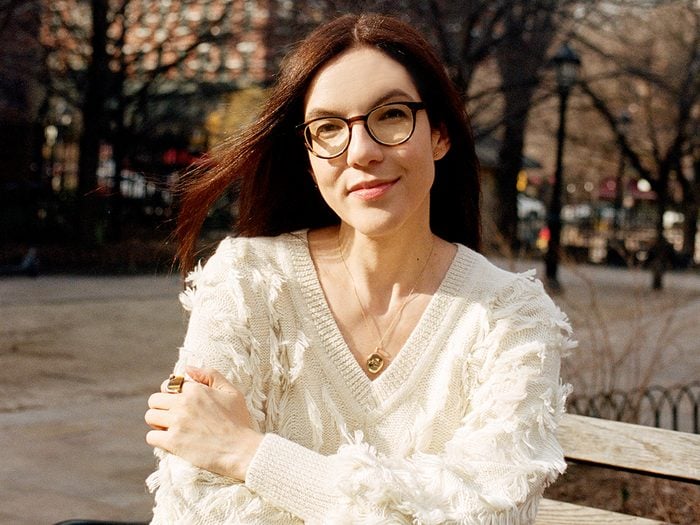The Amorphous Grief of Losing Your Favourite Friend

Writer Sloane Crosley talks to us about her new book Grief Is for People.
On June 27, 2019, a stranger crawled through the bedroom window of Sloane Crosley’s New York apartment and made off with her grandmother’s jewellery. One month later and one state away, her closest friend, Russell Perreault, took his own life. “It’s hard to know the size of things,” Crosley writes in Grief Is for People, and in their immediate aftermath, these two losses—both sudden, both mystifying, but very differently shaped—kept pulling together like magnets, “keeping each other company in the dark.”
Crosley has written novels and essays, but this book is something altogether different: at times a wild caper (she goes to great lengths to retrieve a necklace), at times a black office comedy (both publicists, she and Perrault had a front-row seat to James Frey’s A Million Little Pieces implosion) and, often, a warm portrait of the ways a good friendship can contour so much of our identity. Mostly, though, it is a patient investigation into the unruly, ongoing work of grief, especially when suicide is involved. “Suicide warps the mourning process,” Crosley says. “You’re stuck in the past longer—you’re working the math backwards, trying to pin the loss down, as opposed to working forward through the process.” Here, she discusses finding the permission to feel as wretched as you want to and why it’s no good to pre-grieve.
You’ve said that one should approach new people as if they were grieving. How do you do that?
It’s not necessarily about watching your language, or policing your humour. It’s more about being gentle. I think there should be a baseline of ignorance—you have no idea what it took for people to get out of bed that morning.
I know you read a lot of grief books and listened to a lot of grief podcasts after Russell died. It sounds like, when it comes to loss, friendships rank pretty low in the relationship hierarchy.
Which is funny, because this is the relationship that we all have. We don’t all have children or siblings. Most of us have parents, though that relationship varies in quality. But everybody has a friend. So it was surprising to see how neglected that relationship was. I am not implying any jealousy over friends or relatives who have lost their partner or son, but there’s a bit more of a road map in our culture for that relationship, and for how terrible that loss is. Whereas, as much as I was supported by people who loved me, I felt on my own in terms of navigating the topography of my loss. What was my role? What was our relationship? Was I entitled to be as upset as I was? It felt really amorphous at a time when I could have used more of a foregone conclusion about my grief. I wish other people knew how it was going to affect me. And I wish I knew.
Why don’t friendships get that standing?
Well, the assumption is, it’s less biologically unmooring, right? You’re not missing something you created or that created you. I do think, culturally, we’ve outgrown the assumption of what family looks like—it’s not just Leave It to Beaver. But from a grief perspective, we maybe still think that the nuclear family reigns supreme, and we’re not ready to have friendship fill in that gap.
But there’s so much that is created inside a friendship—a whole language of references and jokes and intimacy.
And you have to work for it, right? It doesn’t come for free. Sometimes I call Russell my best friend, but I’m more apt to call him my favourite person, and I feel like I always try to stress all the different connections that we had. If he was annoying me, it was like a brother. If he was hard on me, it was like a boss. If he was proud of me, it was like a parent. And all these things add up, but that relationship is greater than the sum of its parts, because it’s just a very deep friendship. I’m still caught up short by the fact that he’s not here.
You learned that, between the theft of your jewellery and Russell’s death, you were experiencing something called “grief overload.” That’s such an interesting term, because it assumes there’s a threshold after which grief’s burden becomes too much.
I had a friend growing up whose family was Christian, and they had all sorts of decorative things on the walls. And there was a little sign in the bathroom that said, “God wouldn’t give you more than you could handle.” And I remember even as a kid thinking, that doesn’t seem right. I’m not trying to fact check your bathroom, but that makes no sense. Grief overload was something I researched and found, and it did help to put a label on the strange sort of numbness and blur that I was feeling. And that label did make me feel better, because I think I wanted permission to feel as god awful as I did.
Succession introduced us to the futile concept of pre-grieving. Fine, we can’t game grief in advance, but are there ways we can brace for impact?
I am not an expert on grief or psychology, but I do know a bit about storytelling, and the human aversion to grey areas and to not knowing things. Like, the first flirtation game we play is: Do you like me, check yes or no. So the idea that there will be this unknown in mourning is so scary. You have a sense of it—you’ve seen a movie, you’ve seen friends go through grief, you’ve had someone die before. But you want the full handle on it, and I just don’t think that’s possible or healthy. But it comes from a place where human beings really want to know what’s around the corner.
There’s a line early in the book that I found reassuring: “No one is obliged to learn anything from loss.”
You mentioned the books I had read—I think that line is sort of a rejoinder to those books, because they did feel lesson-y to me. When you have a book about grief, or that is self-help, you get to the end and there’s this tacit sign off: “I hope this has helped you on your grief journey.” I found it almost offensive the way they wrapped up so neatly. I mean, Russell died in 2019. Do I still sometimes think he’s just on a very long vacation and dropped his phone in the toilet? I do.
What do you want readers to take from your book instead?
There’s this strange jockeying, etiquette-wise, that goes on after a death—like, who gets to ride shotgun—and also within ourselves about how long we’re supposed to grieve. And so as this book runs the gamut through different kinds of loss—whether it’s a burglary, a suicide, COVID, even the absence of a certain period of youth—I want people to feel permission to mourn the things that they mourn. The secondary thing is, it’s meant to speak to people who share my aversion to self-help. It says that you can have this emotional, very true, very earnest experience, without having to read a book that has a butterfly on the cover.




